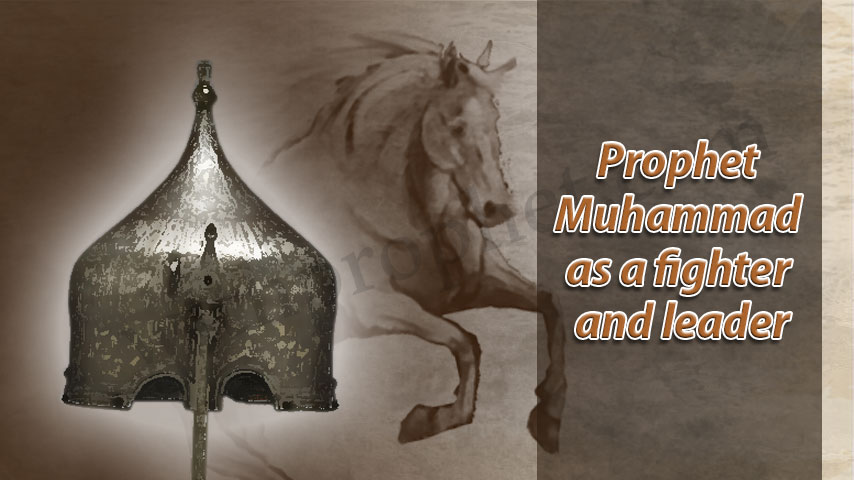
Prophet Muhammed (peace be upon him) as a leader and fighter in Allah’s cause
When was fighting in Allah’s cause made obligatory?
Fighting in Allah’s cause was first made obligatory in Islam in Medinah, after the Messenger of Allah (peace be upon him) immigrated there.
Before that, Muslims were ordered to be patient with the harm the polytheists caused them. Fighting in Allah’s cause was made obligatory as a form of defensive war when it was first laid down in the Islamic legislation:
{ Fight in the way of Allah those who fight you but do not transgress. Indeed. Allah does not like transgressors}
[Surah Al-Baqarah: 190].
After that, offensive jihad (fighting in Allah’s cause) was legislated to stop mankind from worshipping others like them and to stop the oppressors from attacking their religion, from enslaving them and curtailing their freedom. It was also waged to establish the belief and make it spread without any hindrances, and to remove temptation from the people in order for them to be free to choose the true religion by their own free will. Allah (Glorified is He) says,
{Fight them until there is no [more] fitnah [trials] and worship is [acknowledged to be] for Allah . But if they cease, then there is to be no aggression except against the oppressors}
[Surah Al-Baqarah: 193].
Allah (Glorified is He) also says,
{Permission [to fight] has been given to those who are being fought, because they were wronged. And indeed, Allah is able to give them victory. [They are] those who have been evicted from their homes without right--only because they say, “Our Lord is Allah”}
[Surah Al-Hajj: 39-40].
The aim of the Messenger of Allah’s battles
The Messenger of Allah (peace be upon him) carried out many battles to defend Islam and the Muslims, and free the people so they could worship Allah and not be forced to adopt any particular religion.
The Messenger of Allah (peace be upon him) did not attend every battle, although he was brave and wanted to join the battles. This was an act of mercy to his Companions and followers. The Messenger of Allah (peace be upon him) said,
<By Whom my soul is in His hands, if it were not for the believers who did not have a mount to ride to the battlefield and did not want to be away from me, I would not have missed any battle in Allah’s cause. By Whom my soul is in His hands, if I had the choice, I would wish to be killed in Allah’s cause, be brought back to life and be killed again, then brought back to life and be killed again, and brought back to life to be killed [another time]>
[related by Al-Bukhari].
The Messenger of Allah’s wars were to stop the aggressors
[If we look at all the Arab tribes at the time, we would find that they were engrossed with battles. The Messenger of Allah (peace be upon him) did not have permission at that time, although there were many men around him, to physically struggle and defend the Muslims from such enmity by using force. It was only after all these attacks that Divine revelation came to allow him to fight the aggressors]
[John Brow ].
French orientalist
The Messenger of Allah (peace be upon him) is the most intelligent person
[If the criteria we use to measure the intelligence of anyone is the great aim and amazing results he achieves despite the lack of means, who would dare to compare any of the leaders in modern history with the Messenger of Allah (peace be upon him) in terms of his great intelligence?! This man, Muhammed, did not only lead an army, enact a legal legislation, found an empire, and judge the people in a way that made all parties concerned satisfied, but he also lead millions of people, which counted for one-third of the world at that time]
[Alphonse de Lamartine].
A well-known French poet and politician
How can you follow the Messenger of Allah (peace be upon him)?
1. Always display the merciful Islamic manners, being forgiving with the people and calling them to do good.
2. If there is no choice but war, fighting and enmity, fight following the Islamic manners enacted for fighting and do not let your enmity make you overstep the limits or be oppressive.
3. Be gentle when solving matters; the Messenger of Allah (peace be upon him) said,
<Gentleness is not in any matter but it beautifies it>
[related by Malik].